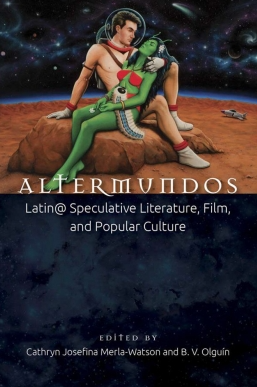 By Jim Logan • UCSB
By Jim Logan • UCSB
Ben Olguín remembers the moment he discovered science fiction. He was a teenager, doing three weeks in jail for being, as he puts it, “a knucklehead.” Books get passed around inside and one of them was a sci-fi anthology.
“So that book, I started reading it,” he recalled. “It was all about alternatives to power, basically a proto-revolutionary meditation on alternative ways of organizing society — beyond greed, beyond power, beyond violence. I didn’t appreciate it so much then, but it stuck with me because it twisted my brain.”
That was some twisting. Today Olguín is the Robert and Liisa Erickson Presidential Chair in the Department of English at UC Santa Barbara. He’s also the co-editor of “Altermundos: Latin@ Speculative Literature, Film and Popular Culture” (UCLA Chicano Studies Research Center Press), a winner of the 39thannual American Book Awards.
Olguín and his co-author, Cathryn Josefina Merla-Watson of the University of Texas Rio Grande Valley, were honored by the Before Columbus Foundation at a recent awards ceremony in San Francisco.

Ben Olguín. Courtesy photo.
While Latino culture might not leap to mind as a well spring of speculative fiction, Olguín called the two “a natural fit” given “the utter bizarreness of Latin American literature.” He pointed to the works of Gabriel García Marquez and Carlos Castaneda as prime examples.
“Latin Americans and some Latinos have used, and had a lot of success with, magical realism,” Olguín said. “It’s strange to everybody else, but when we’re reading it we’re like, ‘Yeah, sometimes people fly.’ That is normalizing this completely different realm of possibilities.”
“Altermundos” was begun as a way of exploring the vast universe of Latino fiction, Olguín said, such as the speculative and “every classic genre of science fiction, but also new fusion genres, like Latino horror, which is part and parcel to Mexican and Mexican American culture. The bridge from Latino culture to science fiction is seamless.”
What makes “Altermundos” unique is that it’s a “hybrid” — scholarship, historiography and original stories by writers like Ernest Hogan, perhaps the most well-known Latino science fiction author. “It fuses the schism between the scholar and the artist,” Olguín explained.
Indeed, the book also includes works from a number of gay and lesbian writers who Olguín noted bring a complexity to their works. “Because think about this: Sci-fi and queer discourse are bedfellows,” he said. “Why? Because queer theories of being always force us to complicate static notions of gender and sexuality. It’s just more complex than anything that we’ve been taught.
“Science fiction was there from the beginning because it’s not just asking us to think about gender differently — or even race differently,” he continued. “It’s asking us to think about species. When they talk about race it’s species; it’s not black, brown or white. So the marriage between Latino/Latina and African American culture and writing with sci-fi and the speculative in general, is just a perfect match to address a lot of the concerns that have been at the forefront of these fields.”
Since its release in 2017, the book has struck a chord in the literary and academic worlds, which Olguín attributed to its originality.
“It’s like we delivered tortillas to the work crew,” he said. “It was like, ‘Give me some of that,’ and they were gone immediately. It was at the right time and the right place because this stuff has been going on for a long time, and no one had put it together all in one place for people to learn about and enjoy.”
